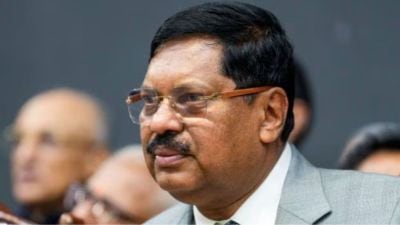Lonely, on the frontline of future
Whatever its outcome, a pre-emptive war against Iraq launched without sanction from the United Nations will transform the world and the Unit...

Whatever its outcome, a pre-emptive war against Iraq launched without sanction from the United Nations will transform the world and the United States’ place in it.
With a quick, successful war in Iraq, the Bush administration just might establish the United States as a kind of 21st-century Rome, dominating the globe while isolating, frustrating and ultimately eliminating its enemies.
But this is far from the only possibility. A bloody war, a hostile reception from Iraqi citizens, failure to uncover hidden biological and chemical weapons, failure to sustain a working Iraqi democracy or unexpected events in other nations or regions could all undermine the US cause.
An angry world could turn against Washington, and the effects could be felt in every multilateral forum, from the UN to the WTO. From the outset of his administration, Bush made clear his belief that the treaties, alliances and institutions that grew up in the Cold War era had to be altered to adapt to new threats and conditions. Since 9/11 the administration has sharpened that point, arguing that new terrorist threats require aggressive vigilance, including preemptive military action, and that the United States will pursue a muscular new policy with whatever allies it can attract.
‘‘The international order as we’ve come to know it is not adequate for the defence of the US in a new century of threats quite unlike any we’ve experienced in the past,’’ said Richard Perle, chairman of the Pentagon’s Defence Policy Board. He defined the new threat as ‘‘existential terrorism’’ intended to kill large numbers of people. ‘‘We are going to have to take the war against them (terrorists) often to other peoples’ territory, and all of the norms of international order make it difficult to do that,’’ Perle said.
‘‘So the president has to reshape fundamental attitudes toward those norms, or we are going to have our hands tied by an antiquated institution (the traditional international system) that is not capable of defending us.’’
More traditionalist students of international politics dismiss such views as nonsensical. ‘‘We don’t know what we’re doing,’’ said Zbigniew Brzezinski of the Center for Strategic and International Studies, who was President Jimmy Carter’s national security adviser.
The United States has never been so isolated in the modern era, Brzezinski said in an interview. ‘‘We cannot handle the world entirely on our own. We are stronger than anyone else, but we are not capable of simply dictating to the entire world, and I think that’s where the administration has really fallen down badly.’’ From Carter’s Middle East negotiations at Camp David to George H.W. Bush’s Persian Gulf War to Bill Clinton’s campaigns against Serbian nationalism in Bosnia and Kosovo, the United States ‘‘had enormous international support on controversial issues,’’ Brzezinski said. ‘‘Now we don’t. And I think the best proof of that is that already on North Korea, we are totally stymied. We cannot antagonise international community on one issue and then expect it to work with us in an accommodating fashion on another.’’
Michael Quinlan, former permanent undersecretary of the British Ministry of Defence, predicted that ‘‘huge resentments’’ brought on by a US-led pre-emptive war will poison international relations, not just between the United States and others, but among Europeans and other countries that are taking differing positions on the war.
‘‘It’s going to open up big fissures in almost every direction,’’ Quinlan said, ‘‘a hugely depressing episode.’’ ‘‘This war will produce a poison in the United States’ closest alliances,’’ said retired Army Gen. WilliamOdom, former director of the National Security Agency and a professor of political science at Yale. ‘‘It comes close to risking exchanging Europe for Iraq.’’
Joseph Joffe, editor of the liberal German political weekly Die Zeit, also sees a breakdown of traditional alliances, but blames the French, Germans and Russians. March 5, the day those three countries’ leaders met in Paris and formed a united front opposed to the US push for war, will be remembered as the day the Atlantic alliance was reversed, Joffe said.
‘‘The new ‘axis’ of Paris-Berlin-Moscow must be seen as an instance of classical balance-of-power politics,’’ Joffe said. Its organisers were less interested in Saddam Hussein than in inhibiting the United States: ‘‘This is about … controlling) American power.’’
The resistance of the six ‘‘undecided’’ Security Council members to a new UN resolution on Iraq in recent weeks may be another example of countries, including US allies, trying to control American power, said Jessica Tuchman Mathews, president of the Carnegie Endowment.
Other countries see ‘‘a US that seems to want to decide for the world … how countries should govern themselves and by whom. They don’t want that, and don’t accept it.’’ Bush has praised other nations for joining a ‘‘vast network of freedom-loving countries’’ to fight terrorism, as he put it last month, and he has often cited the ‘‘principle’’ that binds this coalition: ‘‘Either you’re with us, or you’re with the enemy,’’ as he put it in January.
That stark choice—a formula made famous in the 20th century by Vladimir Lenin, founder of the Soviet state—may be a harder sell after an unpopular US war. ‘‘It sounds like Leonid Brezhnev and Warsaw Pact,’’ Brzezinski said.
Bad consequences could be avoided or minimised, said Dieter Buhl, a German journalist, if the war is quickly won with minimal civilian casualties. Buhl predicted a rush to patch things up with the US by now-critical allies if the war goes well: ‘‘Nothing really is as successful as success.’’ (LA Times-Washington Post)
Photos


- 01
- 02
- 03
- 04
- 05





























